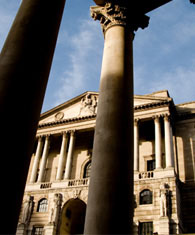 The Bank of England should keep its monetary powder dry tomorrow as global markets focus on a potentially game-changing policy decision by the European Central Bank, according to The Times’ Shadow Monetary Policy Committee. Sir Steve Robson, the former second permanent secretary to the Treasury, said that the Bank’s policymakers should refrain from cutting rates or pumping more money into the economy and instead monitor events in Frankfurt. The ECB’s policy meeting “has the potential to be either a game-changer or a big disappointment”, he said. “The odds seem to be moving in the direction of disappointment and the Bank’s firepower should be kept in reserve in case it is.” Signs of more stubborn inflation in the UK add to arguments for the Bank’s Monetary Policy Committee to sit on its hands, Geoffrey Dicks, chief economist at Novus Capital Markets, said. He warned: “Unless they deliver on inflation, they won’t deliver on the real economy, either,” the newspaper reports.
The Bank of England should keep its monetary powder dry tomorrow as global markets focus on a potentially game-changing policy decision by the European Central Bank, according to The Times’ Shadow Monetary Policy Committee. Sir Steve Robson, the former second permanent secretary to the Treasury, said that the Bank’s policymakers should refrain from cutting rates or pumping more money into the economy and instead monitor events in Frankfurt. The ECB’s policy meeting “has the potential to be either a game-changer or a big disappointment”, he said. “The odds seem to be moving in the direction of disappointment and the Bank’s firepower should be kept in reserve in case it is.” Signs of more stubborn inflation in the UK add to arguments for the Bank’s Monetary Policy Committee to sit on its hands, Geoffrey Dicks, chief economist at Novus Capital Markets, said. He warned: “Unless they deliver on inflation, they won’t deliver on the real economy, either,” the newspaper reports.
The US Department of Justice intends to prove at trial that gross negligence or wilful misconduct by BP caused the 2010 Deepwater Horizon disaster in the Gulf of Mexico, government lawyers have said, in the clearest statement yet that they are seeking the maximum possible penalties from the British oil group. In a ferociously worded memo, filed with the New Orleans court that is hearing the civil case over the spill, DoJ lawyers accused BP of a “culture of corporate recklessness,” as revealed by email exchanges among BP staff before the explosion on the rig. “The behaviour, words and actions of these BP executives would not be tolerated in a middling size company manufacturing dry goods for sale in a suburban mall,” the government lawyers wrote, The Financial Times says.
Lloyds is to put €2bn (£1.6bn) of Irish property loans on the market as it continues to retreat from Ireland. The loans are a legacy of Lloyds’ 2008 takeover of Halifax Bank of Scotland, which included a vast amount of bad debts run up during the boom. The €2bn portfolio is likely to sell for less than face value. A spokesman for Lloyds declined to comment. The sale is the latest in a number of similar, though mostly smaller, portfolios that have been put on the market by banks including AIB and Bank of Ireland. Lloyds is 40 per cent owned by the taxpayer after the 2008 rescue by the UK government, The Independent explains.
Airline bosses have welcomed the arrival of Patrick Mc.Loughlin as Transport Secretary as a signal that plans for Heathrow expansion could finally be cleared for take-off. In David Cameron’s first Cabinet reshuffle, Mr Mc. Loughlin replaced Justine Greening, MP for Putney, who was staunchly opposed to plans for a third runway. Mr McLoughlin, former chief whip who served in Margaret Thatcher’s transport ministry, once admitted he was afraid of flying. He is the sixth Transport Secretary in five years. A spokesman for IAG, the owner of British Airways, said: “We welcome [Mr McLoughlin’s] appointment and hope it signals that the Government is now serious about tackling urgently the hub airport capacity issues facing the UK,” The Telegraph writes.
Surging demand from emerging markets will see orders for 28,000 new aircraft over the next 20 years, Airbus predicted today. The Asia Pacific region will account for the biggest tranche of the $3.9trn (£2.45trn) worth of new planes, according to the European manufacturer’s projections. The company expects the overall global passenger plane fleet to more than double from 15,500 to 32,550 by 2031. The freight fleet will grow at a slightly slower rate to about 3,000. Over the same period, passenger traffic should grow by about 4.7% a year. Airbus’ order projections were more optimistic than last year, with the company now expecting 1.3% more production than originally predicted. The Asia Pacific region will account for 35% of new aircraft deliveries, more than any other region. Europe and North America will take 21% each, The Telegraph says.
Marks and Spencer has reshuffled its general merchandise team, poaching Stephanie Chen, director of womenswear at House of Fraser, and elevating M&S director Scott Fyfe to head of menswear. M&S confirmed Ms Chen would become a director, responsible for M&S’s homewares and childrenswear, by March 2013. The changes are the first to be made by John Dixon, previously head of food at M&S, who was appointed as executive director of M&S’s general merchandise business in July, succeeding Kate Bostock, The Financial Times reports.
Consumers could face more spikes in food prices as extreme weather caused by climate change affects major crops worldwide, according to a new Oxfam report. The charity claims that the full impact of climate change on future food prices is being underestimated and warns that consumers will become more vulnerable to events like the current US drought as dependence on exports of wheat and maize increases. The report, titled Extreme Weather, Extreme Prices, says a US drought in 2030 could raise the price of maize by as much as 140% over and above the average price of food, which is already likely to be double today’s prices. Drought and flooding in southern Africa could increase the consumer price of maize and other coarse grains by as much as 120% by 2030, the report says, according to The Scotsman.
Five years after forming a mobile phone books venture over a drink in a Battersea Park pub, the bestselling author Andy McNab has made his first million as an entrepreneur. The former SAS operative, who has already made a small fortune writing of his derring-do in the first Gulf War, agreed yesterday to sell Mobcast to Tesco for £4.5m as Britain’s biggest grocer continues its expansion in the digital sector. The acquisition marks Tesco’s latest foray into digital. In June it paid £10.7m for a 91% stake in We7, a music-streaming business whose founding members included the musician Peter Gabriel. Last year Tesco bought an 80% stake in Blinkbox, a film-streaming business, The Times reports.
Activity among the UK’s banks, hauliers, accountants and other services industries that make up three-quarters of the UK economy, increased by more than expected in August and produced the strongest performance in five months. The closely-watched Purchasing Managers’ Index (PMI), on which a reading above 50 implies expansion, rose from 51 in July to 53.7, against forecasts of just 51.2. The surprising strength of services countered declines in both manufacturing and construction in August, delivering a welcome boost to confidence and reducing the prospect of an interest-rate cut or more money-printing by the Bank of England tomorrow . Vicky Redwood, at Capital Economics, said: “A weighted average of the surveys is consistent with quarterly GDP growth of 0.1pc or so, suggesting the economy may just about be clawing its way out of recession,” The Telegraph says.
In an escalating game of brinkmanship, Spanish finance minister Luis de Guindos said his country is not yet willing to sign a Memorandum giving up fiscal sovereignty to EU inspectors. “First of all, one must clarify the conditions,” he told German newspaper Handelsblatt. Mr de Guindos said the crisis engulfing the region is larger than any one country and warned north Europe not to scapegoat Spain. “My colleagues are aware that the battle for the euro will be fought in Spain. Spain is right now the breakwater for the Eurozone,” he said, adding that “solidarity” would be well-advised. The warning comes as German Chancellor Angela Merkel leaves for Madrid for talks with premier Mariano Rajoy to thrash out the conditions of a full sovereign rescue of up €300bn (£238bn), beyond the €100bn bank rescue already agreed, according to The Telegraph.







